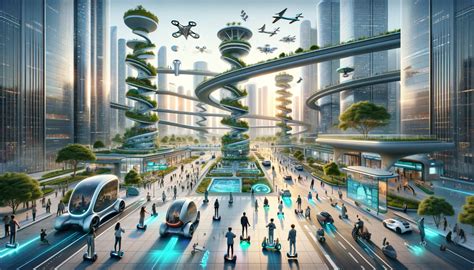The world of transportation is on the cusp of a revolution, driven by technological advancements that are transforming the way we travel. From electric and self-driving vehicles to hyperloops and flying cars, the future of transportation is looking faster, cleaner, and more efficient than ever before. In this article, we'll explore the latest innovations in transportation technology and what they mean for the future of travel.
The Rise of Electric Vehicles

One of the most significant trends in transportation technology is the rise of electric vehicles (EVs). With many countries setting targets to phase out internal combustion engines, EVs are becoming increasingly popular. Companies like Tesla, Volkswagen, and Nissan are leading the charge, with a wide range of electric models available in the market. EVs offer several benefits, including zero tailpipe emissions, lower operating costs, and a smoother, quieter ride.
Benefits of Electric Vehicles
- Zero tailpipe emissions, reducing greenhouse gas emissions and air pollution
- Lower operating costs, with electricity being generally cheaper than gasoline
- Smooth and quiet ride, providing a more comfortable driving experience
- Government incentives, such as tax credits and rebates, to encourage adoption
The Advent of Self-Driving Cars

Another significant development in transportation technology is the advent of self-driving cars. Companies like Waymo, Cruise, and Argo AI are working on developing autonomous vehicles that can navigate roads without human intervention. Self-driving cars promise to revolutionize the way we travel, making roads safer, reducing traffic congestion, and providing greater mobility for the elderly and disabled.
Benefits of Self-Driving Cars
- Improved safety, with the potential to reduce accidents caused by human error
- Increased mobility, providing transportation for the elderly, disabled, and those who cannot drive
- Reduced traffic congestion, with autonomous vehicles able to optimize traffic flow
- Enhanced productivity, with passengers able to use their time more efficiently
Hyperloop: The Future of High-Speed Travel

Imagine traveling from Los Angeles to San Francisco in just 30 minutes. Sounds like science fiction, right? But with the Hyperloop, a high-speed transportation system developed by Elon Musk, it's becoming a reality. The Hyperloop uses vacuum-sealed tubes and magnetic levitation to propel vehicles at speeds of up to 700 mph, making it faster than air travel.
Benefits of Hyperloop
- High-speed travel, reducing travel times between cities
- Sustainable and energy-efficient, with the potential to reduce greenhouse gas emissions
- Cost-effective, with the potential to reduce transportation costs
- Increased productivity, with passengers able to use their time more efficiently
Flying Cars: The Next Frontier in Transportation

Flying cars, also known as personal aerial vehicles (PAVs), are being developed by companies like Uber, Lilium, and Joby Aviation. These vehicles use electric propulsion and vertical takeoff and landing (VTOL) technology to transport people and goods. Flying cars promise to revolutionize urban transportation, reducing traffic congestion and providing faster travel times.
Benefits of Flying Cars
- Reduced traffic congestion, with the potential to reduce travel times
- Increased mobility, providing transportation for those who cannot drive
- Sustainable and energy-efficient, with the potential to reduce greenhouse gas emissions
- Enhanced productivity, with passengers able to use their time more efficiently
Gallery of Transportation Technology






Frequently Asked Questions
What is the future of transportation?
+The future of transportation is being shaped by technological advancements, including electric vehicles, self-driving cars, hyperloop, and flying cars. These innovations promise to make transportation faster, cleaner, and more efficient.
Are electric vehicles really sustainable?
+Yes, electric vehicles are a sustainable option, with zero tailpipe emissions and lower operating costs. However, the production of EVs requires energy and resources, and the source of the electricity used to charge them is important.
Will self-driving cars replace human drivers?
+Self-driving cars will likely augment human drivers, rather than replace them entirely. Autonomous vehicles will be used in specific contexts, such as ride-hailing and trucking, but human drivers will still be needed in many situations.
As we look to the future, it's clear that transportation technology will continue to evolve and shape the way we travel. Whether it's electric vehicles, self-driving cars, or flying cars, the possibilities are endless, and the potential benefits are significant. As we embark on this journey, it's essential to prioritize sustainability, safety, and accessibility, ensuring that the future of transportation is one that benefits everyone.
